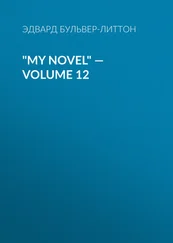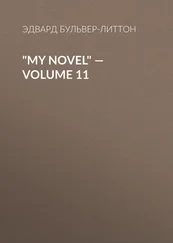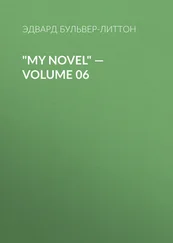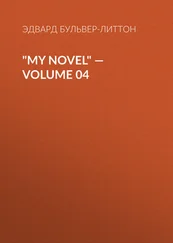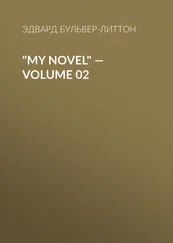Эдвард Бульвер-Литтон - My Novel — Complete
Здесь есть возможность читать онлайн «Эдвард Бульвер-Литтон - My Novel — Complete» — ознакомительный отрывок электронной книги совершенно бесплатно, а после прочтения отрывка купить полную версию. В некоторых случаях можно слушать аудио, скачать через торрент в формате fb2 и присутствует краткое содержание. Жанр: foreign_prose, literature_19, Европейская старинная литература, foreign_antique, на английском языке. Описание произведения, (предисловие) а так же отзывы посетителей доступны на портале библиотеки ЛибКат.
- Название:My Novel — Complete
- Автор:
- Жанр:
- Год:неизвестен
- ISBN:нет данных
- Рейтинг книги:5 / 5. Голосов: 1
-
Избранное:Добавить в избранное
- Отзывы:
-
Ваша оценка:
- 100
- 1
- 2
- 3
- 4
- 5
My Novel — Complete: краткое содержание, описание и аннотация
Предлагаем к чтению аннотацию, описание, краткое содержание или предисловие (зависит от того, что написал сам автор книги «My Novel — Complete»). Если вы не нашли необходимую информацию о книге — напишите в комментариях, мы постараемся отыскать её.
My Novel — Complete — читать онлайн ознакомительный отрывок
Ниже представлен текст книги, разбитый по страницам. Система сохранения места последней прочитанной страницы, позволяет с удобством читать онлайн бесплатно книгу «My Novel — Complete», без необходимости каждый раз заново искать на чём Вы остановились. Поставьте закладку, и сможете в любой момент перейти на страницу, на которой закончили чтение.
Интервал:
Закладка:
However, before the parson could notice the sigh or conjecture the cause, Dr. Riccabocca’s thin lips took an expression almost malignant.
“Per Bacco!” said he; “in every country I observe that the rooks settle where the trees are the finest. I am sure that, when Noah first landed on Ararat, he must have found some gentleman in black already settled in the pleasantest part of the mountain, and waiting for his tenth of the cattle as they came out of the Ark.”
The parson fixed his meek eyes on the philosopher, and there was in them something so deprecating rather than reproachful that Dr. Riccabocca turned away his face, and refilled his pipe. Dr. Riccabocca abhorred priests; but though Parson Dale was emphatically a parson, he seemed at that moment so little of what Dr. Riccabocca understood by a priest that the Italian’s heart smote him for his irreverent jest on the cloth. Luckily at this moment there was a diversion to that untoward commencement of conversation in the appearance of no less a personage than the donkey himself—I mean the donkey who ate the apple.
CHAPTER VI
The tinker was a stout, swarthy fellow, jovial and musical withal, for he was singing a stave as he flourished his staff, and at the end of each refrain down came the staff on the quarters of the donkey. The tinker went behind and sang, the donkey went before and was thwacked.
“Yours is a droll country,” quoth Dr. Riccabocca; “in mine, it is not the ass that walks first in the procession that gets the blows.”
The parson jumped from the stile, and looking over the hedge that divided the field from the road—“Gently, gently,” said he; “the sound of the stick spoils the singing! Oh, Mr. Sprott, Mr. Sprott! a good man is merciful to his beast.”
The donkey seemed to recognize the voice of its friend, for it stopped short, pricked one ear wistfully, and looked up. The tinker touched his hat, and looked up too. “Lord bless your reverence! he does not mind it,—he likes it. I vould not hurt thee; would I, Neddy?”
The donkey shook his head and shivered; perhaps a fly had settled on the sore, which the chestnut leaves no longer protected.
“I am sure you did not mean to hurt him, Sprott,” said the parson, more politely I fear than honestly,—for he had seen enough of that cross-grained thing called the human heart, even in the little world of a country parish, to know that it requires management and coaxing and flattering, to interfere successfully between a man and his own donkey,—“I am sure you did not mean to hurt him; but he has already got a sore on his shoulder as big as my hand, poor thing!”
“Lord love ‘un! yes; that was done a playing with the manger the day I gave ‘un oats!” said the tinker.
Dr. Riccabocca adjusted his spectacles, and surveyed the ass. The ass pricked up his other ear, and surveyed Dr. Riccabocca. In that mutual survey of physical qualifications, each being regarded according to the average symmetry of its species, it may be doubted whether the advantage was on the side of the philosopher.
The parson had a great notion of the wisdom of his friend in all matters not purely ecclesiastical.
“Say a good word for the donkey!” whispered he.
“Sir,” said the doctor, addressing Mr. Sprott, with a respectful salutation, “there’s a great kettle at my house—the Casino—which wants soldering: can you recommend me a tinker?”
“Why, that’s all in my line,” said Sprott; “and there ben’t a tinker in the county that I vould recommend like myself, tho’f I say it.”
“You jest, good sir,” said the doctor, smiling pleasantly. “A man who can’t mend a hole in his own donkey can never demean himself by patching up my great kettle.”
“Lord, sir!” said the tinker, archly, “if I had known that poor Neddy had had two sitch friends in court, I’d have seen he vas a gintleman, and treated him as sitch.”
“Corpo di Bacco!” quoth the doctor, “though that jest’s not new, I think the tinker comes very well out of it.”
“True; but the donkey!” said the parson; “I’ve a great mind to buy it.”
“Permit me to tell you an anecdote in point,” said Dr. Riccabocca.
“Well?” said the parson, interrogatively.
“Once on a time,” pursued Riccabocca, “the Emperor Adrian, going to the public baths, saw an old soldier, who had served under him, rubbing his back against the marble wall. The emperor, who was a wise, and therefore a curious, inquisitive man, sent for the soldier, and asked him why he resorted to that sort of friction. ‘Because,’ answered the veteran, ‘I am too poor to have slaves to rub me down.’ The emperor was touched, and gave him slaves and money. The next day, when Adrian went to the baths, all the old men in the city were to be seen rubbing themselves against the marble as hard as they could. The emperor sent for them, and asked them the same question which he had put to the soldier; the cunning old rogues, of course, made the same answer. ‘Friends,’ said Adrian, ‘since there are so many of you, you will just rub one another!’ Mr. Dale, if you don’t want to have all the donkeys in the county with holes in their shoulders, you had better not buy the tinker’s!”
“It is the hardest thing in the world to do the least bit of good,” groaned the parson, as he broke a twig off the hedge nervously, snapped it in two, and flung away the fragments: one of them hit the donkey on the nose. If the ass could have spoken Latin he would have said, “Et tu, Brute!” As it was, he hung down his ears, and walked on.
“Gee hup,” said the tinker, and he followed the ass. Then stopping, he looked over his shoulder, and seeing that the parson’s eyes were gazing mournfully on his protege, “Never fear, your reverence,” cried the tinker, kindly, “I’ll not spite ‘un.”
CHAPTER VII
“Four, o’clock,” cried the parson, looking at his watch; “half an hour after dinner-time, and Mrs. Dale particularly begged me to be punctual, because of the fine trout the squire sent us. Will you venture on what our homely language calls ‘pot-luck,’ Doctor?”
Now Riccabocca was a professed philosopher, and valued himself on his penetration into the motives of human conduct. And when the parson thus invited him to pot-luck, he smiled with a kind of lofty complacency; for Mrs. Dale enjoyed the reputation of having what her friends styled “her little tempers.” And, as well-bred ladies rarely indulge “little tempers” in the presence of a third person not of the family, so Dr. Riccabocca instantly concluded that he was invited to stand between the pot and the luck! Nevertheless—as he was fond of trout, and a much more good-natured man than he ought to have been according to his principles—he accepted the hospitality; but he did so with a sly look from over his spectacles, which brought a blush into the guilty cheeks of the parson. Certainly Riccabocca had for once guessed right in his estimate of human motives.
The two walked on, crossed a little bridge that spanned the rill, and entered the parsonage lawn. Two dogs, that seemed to have sat on watch for their master, sprang towards him, barking; and the sound drew the notice of Mrs. Dale, who, with parasol in hand, sallied out from the sash window which opened on the lawn. Now, O reader! I know that, in thy secret heart, thou art chuckling over the want of knowledge in the sacred arcana of the domestic hearth betrayed by the author; thou art saying to thyself, “A pretty way to conciliate ‘little tempers’ indeed, to add to the offence of spoiling the fish the crime of bringing an unexpected friend to eat it. Pot-luck, quotha, when the pot ‘s boiled over this half hour!”
But, to thy utter shame and confusion, O reader! learn that both the author and Parson Dale knew very well what they were about.
Читать дальшеИнтервал:
Закладка:
Похожие книги на «My Novel — Complete»
Представляем Вашему вниманию похожие книги на «My Novel — Complete» списком для выбора. Мы отобрали схожую по названию и смыслу литературу в надежде предоставить читателям больше вариантов отыскать новые, интересные, ещё непрочитанные произведения.
Обсуждение, отзывы о книге «My Novel — Complete» и просто собственные мнения читателей. Оставьте ваши комментарии, напишите, что Вы думаете о произведении, его смысле или главных героях. Укажите что конкретно понравилось, а что нет, и почему Вы так считаете.



